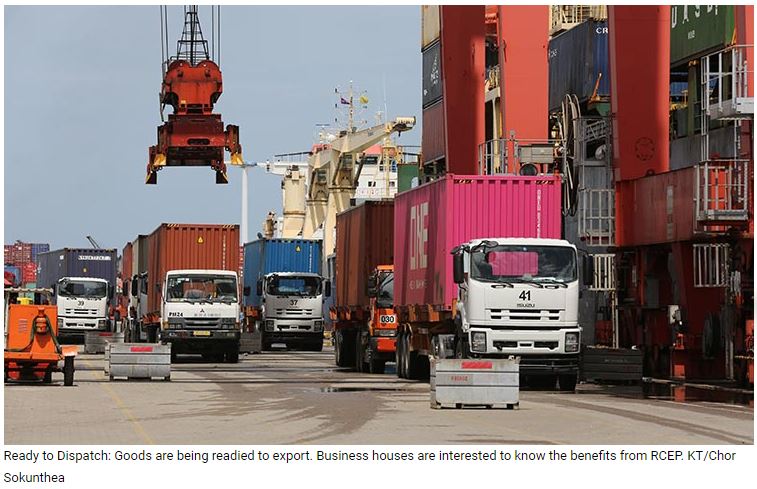Cambodia: Government, experts discuss RCEP benefits
The benefits of the Regional Comprehensive Economic Partnership (RCEP) was discussed threadbare during ‘Unpacking the RCEP Agreement’ an online meeting yesterday. Sim Sokheng, Secretary of State of the Ministry of Commerce, opened the online event organised by ERIA, Economic Research Institute for ASEAN and East Asia, to discuss the Rules Of Origin (ROO) that determines which goods that originate from RCEP member countries can benefit from preferential tariff treatment between a panel of experts and the members of the public.
The focus during the discussion was on how the benefits from the Regional Comprehensive Economic Partnership (RCEP) and the removal of certain tariffs between member countries and which came into effect January 1, could be enjoyed by as many Cambodian businesses as possible.
“The private sector is the backbone of the economy’s growth,” Sokheng said in his opening remarks, a sentiment echoed several times during the meeting by other experts.
ERIA’s Director of Capacity, Jeremy Gross said that “sustained outreach to the private sector is essential”, and in reference to the 100,000 views within the first few hours of the ministry’s posting of information about RCEP on a trade board he said, “Shows there’s a real thirst for information about RCEP so ERIA is very much looking forward to continuing our cooperation with the ministry.”
Deborah Elms, Executive Director, Asian Trade Centre who works with governments and companies to help decide trade policy for the region, helped provide a precise description of what the RCEP provisions are and made an insightful contribution to the technicalities of the RCEP and how businesses should be aware of if they want to benefit from it as well as lauding the government for its work so far.
“One of the most impressive things about Cambodia is the ability of the Cambodian Government to be forward-looking,” she said, adding, “I’m pleased to say that Cambodia so far has been in front of many governments in the region in trying to get this information into the hands of businesses and making it accessible.”
Elms, however, warned that benefitting from the RCEP is not automatic and “the only way we get the benefits of the trade agreement is if you follow the rules, and you have to understand what those rules are and how they apply to your business.”
She encouraged businesses interested in benefitting from the RCEP to contact the Ministry of Commerce in learning what tariffs are being removed and what rules need to be followed in order to get this prized Proof Of Origin Certificate (POC).
Un Chantha, Director of Export-Import Department of the Ministry of Commerce, assured that the Ministry is conducting “various in-house training among our officers who are in charge of the issue of origin.”
Clint O’Connell, Partner and Head of Tax and Customs of the markets with tax and advisory investment firm DFDL, agreed that the key to unlocking the agreement’s benefits was the ROOs, adding that not all companies were getting the required attention: “There are some industries where I think we need to improve with respect to teaching about the benefits of free trade agreements such as this one,” though he gave credit to Sok Siphana for the “fantastic job in spreading the word”.
However, he stressed that SME’s and certain industries don’t have a history of exporting commodities like agriculture, which he sees as a key industry. More attention education on the RCEP is needed going forward. Present in the online meeting also include Sok Siphana, senior advisor to the Royal Government of Cambodia.
Source: https://www.khmertimeskh.com/501023104/government-experts-discuss-rcep-benefits/


 English
English




